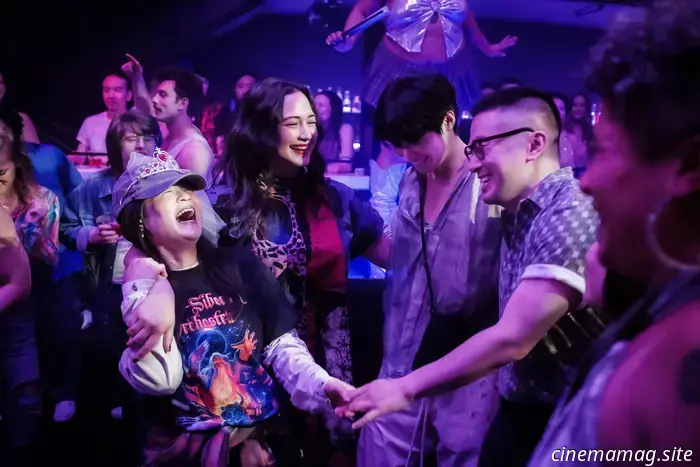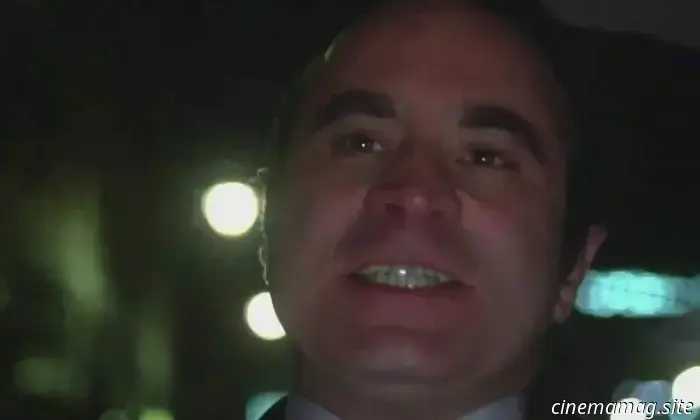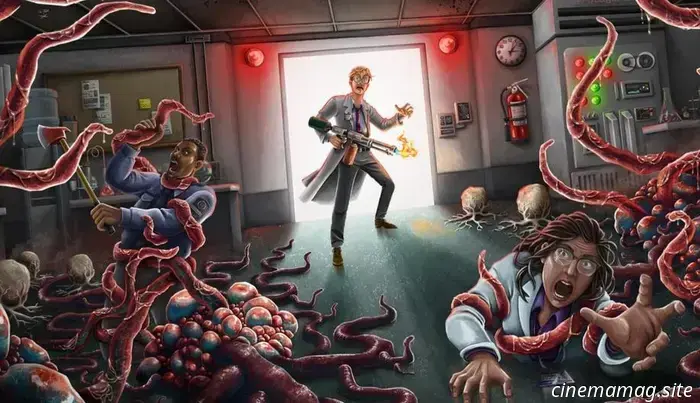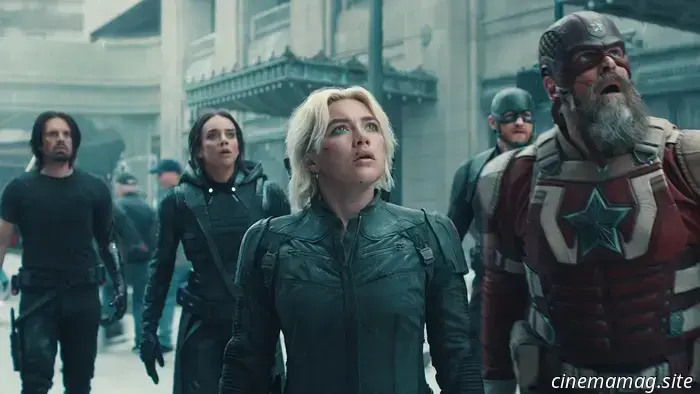
The Wedding Banquet Review: Andrew Ahn Creates a Charming and Humorous Reimagining
Remaking a film from the Library of Congress’s National Film Registry is no small feat. Ang Lee’s The Wedding Banquet raises the stakes even further with its Golden Bear win and Oscar nomination. Such accolades create immense expectations for anyone willing to reimagine this romantic comedy for a modern audience, 30 years later. Nevertheless, Andrew Ahn accepted the challenge, collaborating with original co-writer James Schamus to enhance the story by introducing more gay couples into the mix and adding a baby for good measure.
The plot has shifted from focusing on a dating service financed by the parents of a son who hasn’t come out to them, and a broke tenant persuaded to marry him for a green card. Now, it is the son who requires the green card. Min (Han Gi-Chan) has maxed out his student visa, and his grandmother (Youn Yuh-jung’s Ja-Young) presents him with a choice: take his place as heir to his grandfather’s international business or return to South Korea. In a romantic twist, he opts for a third option: propose to his American boyfriend of five years (Bowen Yang’s Chris), gain citizenship, and forgo his substantial inheritance.
Although Min’s predicament serves as the catalyst for the story, he isn’t the central character. He knows his desires and is prepared to take risks, regardless of the consequences. This sentiment also applies to Lily Gladstone’s Lee, an openly proud community member who dreams of motherhood with her girlfriend Angela (Kelly Marie Tran). They’ve risked their financial future for IVF treatment, and the financial strain only strengthens Lee’s determination to see it through. She is committed to having a baby and raising it with Angela, regardless of the obstacles. If Min and Lee had their way, the movie would end before it even begins.
The focus then shifts to Chris and Angela, who are more chaotic in nature—lacking self-esteem and feeling unworthy of their accomplished partners, which threatens to undermine the happy lives they’ve built. Complicating matters, they are best friends. Their mutual support is intertwined with their shared issues, pulling them deeper into their own struggles. It becomes clear that Min and Lee must intervene, even if it requires a wild proposal: Min will fund Lee and Angela’s IVF efforts if Angela agrees to marry him so that he can remain while Chris finds clarity.
In this twist, Min and Lee find themselves in the middle of the chaos, and things spiral from there. The situation involves much more than simply obtaining a marriage certificate. Ja-Young wants to visit America to meet her grandson’s fiancé, and Angela’s mother May Chen (Joan Chen) is at a loss on how to react to her daughter marrying a man, having based much of her identity on being the mother of a lesbian. When Min’s finances for the IVF treatment are accidentally misallocated, tension builds. Chris has already experienced his breakdown when he hesitated over Min’s proposal, doubting his capability to meet his needs. Now Angela is faced with her own crisis, questioning if she can fulfill Lee’s nurturing aspirations.
Another complication arises, further upending the situation, but it serves merely as one more excuse. Both Chris and Angela are drawn to self-sabotage, convinced of their inadequacies despite lacking logical reasons for such thoughts. Min and Lee can only be so patient; they must eventually determine if this stagnant state is worthwhile for the happily-ever-after they envision, which may never materialize. Many emotional hurdles need to be addressed, supported by both expected (Ja-Young and Chris’ cousin Kendall, portrayed by Bobo Le) and unexpected (May Chen) sources of love and inspiration. It’s a pivotal moment for the characters.
The film is incredibly charming and sweet, yet also very humorous. Tran and Yang bear much of the burden in their journey of recovery from the pitfalls they’ve created. However, it is Gladstone and Gi-Chan who truly shine, infusing their characters with emotional depth and yearning for their partners to awaken to their potential. I appreciated the visual humor (Ahn ensures the camera captures all the “too gay” books and movies that Ja-Young cannot comprehend) and found the Star Wars joke targeting Tran hilarious. But the real standouts are the brilliant performances of Youn and Chen, who bring impeccable comedic timing, moving emotional depth, and a genuine understanding of their character’s growth into what Min and Angela need, even if their realization takes longer than necessary.
The Wedding Banquet is now playing in theaters.
Other articles
 The featurette for Jurassic World: Rebirth hints at a comeback to the 'Classic Jurassic' vibe.
A new featurette has been released online for Jurassic World: Rebirth, featuring the cast and crew discussing how the upcoming installment in the adventure franchise pays homage to Steven Spielberg's 1993 classic, Jurassic Park; you can watch it below... Set five years after the events of Jurassic World Dominion, the planet's ecology has shown to be largely […]
The featurette for Jurassic World: Rebirth hints at a comeback to the 'Classic Jurassic' vibe.
A new featurette has been released online for Jurassic World: Rebirth, featuring the cast and crew discussing how the upcoming installment in the adventure franchise pays homage to Steven Spielberg's 1993 classic, Jurassic Park; you can watch it below... Set five years after the events of Jurassic World Dominion, the planet's ecology has shown to be largely […]
 The Legend of Ochi Review: A Straightforward Fantasy Showcasing Remarkable Craftsmanship and Performances
The Legend of Ochi, created and directed by Isaiah Saxon, is a charming journey rooted in creativity and artistry. It undeniably has the qualities of a film that will endure over time. With minimal dialogue and an abundance of style, it portrays the few inhabitants of a village located on the island of Carpathia:
The Legend of Ochi Review: A Straightforward Fantasy Showcasing Remarkable Craftsmanship and Performances
The Legend of Ochi, created and directed by Isaiah Saxon, is a charming journey rooted in creativity and artistry. It undeniably has the qualities of a film that will endure over time. With minimal dialogue and an abundance of style, it portrays the few inhabitants of a village located on the island of Carpathia:
 The Long Good Friday: Still the Ultimate British Gangster Movie
With Easter approaching, Tom Jolliffe reflects on The Long Good Friday... The time for chocolate eggs is here, and while those considering seasonal films related to Easter might focus on faith-based narratives, there’s also another movie closely connected to the holiday: The Long Good Friday. This film emerges during a transitional […]
The Long Good Friday: Still the Ultimate British Gangster Movie
With Easter approaching, Tom Jolliffe reflects on The Long Good Friday... The time for chocolate eggs is here, and while those considering seasonal films related to Easter might focus on faith-based narratives, there’s also another movie closely connected to the holiday: The Long Good Friday. This film emerges during a transitional […]
 Gail Simone is writing a prequel comic book for Zack Snyder's Rebel Moon: Nemesis.
Titan Comics has revealed that renowned creator Gail Simone is collaborating with artist Federico Bertoni to broaden the universe of Zack Snyder’s Rebel Moon franchise through a four-issue prequel comic titled Rebel Moon: Nemesis. This series will explore the background of the sword-wielding cyborg assassin. “It seems to me that this story was somewhat meant to be, […]
Gail Simone is writing a prequel comic book for Zack Snyder's Rebel Moon: Nemesis.
Titan Comics has revealed that renowned creator Gail Simone is collaborating with artist Federico Bertoni to broaden the universe of Zack Snyder’s Rebel Moon franchise through a four-issue prequel comic titled Rebel Moon: Nemesis. This series will explore the background of the sword-wielding cyborg assassin. “It seems to me that this story was somewhat meant to be, […]
 The action roguelite Demon Spore has announced its release date for July, accompanied by a new animated trailer.
Null Games and Dino Boss have revealed that their 80’s horror-themed action roguelite, Demon Spore, will be launched in July. Along with this announcement, they have released a new animated trailer (see below) that delves into the backstory of the titular Demon Spore. Players who have enjoyed the game’s demo available on Steam may […]
The action roguelite Demon Spore has announced its release date for July, accompanied by a new animated trailer.
Null Games and Dino Boss have revealed that their 80’s horror-themed action roguelite, Demon Spore, will be launched in July. Along with this announcement, they have released a new animated trailer (see below) that delves into the backstory of the titular Demon Spore. Players who have enjoyed the game’s demo available on Steam may […]
 The trailer for Marvel's Thunderbolts gives a glimpse of the conclusion to Phase Five.
While The Fantastic Four: First Steps has been grabbing attention this week with its latest trailer, we still have one last installment of Phase Five of the Marvel Cinematic Universe to look forward to. To remind us of this, Marvel Studios has released another trailer for its antihero ensemble film, Thunderbolts, ahead of its premiere in […]
The trailer for Marvel's Thunderbolts gives a glimpse of the conclusion to Phase Five.
While The Fantastic Four: First Steps has been grabbing attention this week with its latest trailer, we still have one last installment of Phase Five of the Marvel Cinematic Universe to look forward to. To remind us of this, Marvel Studios has released another trailer for its antihero ensemble film, Thunderbolts, ahead of its premiere in […]
The Wedding Banquet Review: Andrew Ahn Creates a Charming and Humorous Reimagining
Producing a remake of a film from the Library of Congress's National Film Registry is not a task to be approached casually. Ang Lee's The Wedding Banquet intensifies this pressure by boasting a Golden Bear win and an Oscar nomination. Such accolades create significant expectations for anyone who would take on the project.
